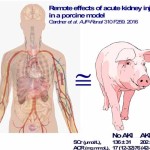Tag Archives:kidney
Towards organs on demand: a new platform for successful kidney organogenesis
Animal-free platforms for the efficient and accurate prediction of kidney toxicity in humans
Should we use gentamicin cream to prevent exit-site infection in peritoneal dialysis?
Renal cell carcinoma: can we identify patients with advanced disease?
Does acute kidney injury affect other organs?
AZGP1, a new candidate for the treatment of chronic kidney disease
“Nothing to worry about”? The meaning of a Chronic Kidney Disease (CKD) diagnosis for patients put on a disease register
We interviewed a group of people who had been recruited to a trial for people with early stage Chronic Kidney Disease (CKD). The wider trial was concerned with finding out whether helping people with early stage CKD
CKD affects mortality in TAVI patients
Modulation of bad cholesterol: what happens when patients with kidney disease receive omega-3-fatty acids?
Just as oil cannot dissolve in water, so cannot fat dissolve in blood. In order for our bodies to transport cholesterol, which is made of fat (lipids), within our bloodstreams something is needed to carry it around.
A way to a man’s (or women’s) kidney is through the stomach
Kidney cancer can be difficult to diagnose. A biopsy may be needed. Kidney biopsy is usually taken by passing a needle from the outside of the patient into the kidney. The needle is passed from the patient’s
Kidney angiotensinogen as a cardinal risk factor in hypertension
Advanced green antibacterial materials made by mussel-inspired chemistry
Fully human anti-CAIX antibodies for RCC immunotherapy
Renal risk associated with sodium phosphate medication
Kidney disease dramatically affects whether patients should undergo vascular interventions
Kidney disease is a significant risk factor for poor outcomes following vascular surgery, and should be taken into consideration when evaluating patients for elective vascular interventions. Patients with kidney dysfunction who are recommended intervention by a vascular
CRIC: studying the silent epidemic of kidney disease
Onco-Nephrology: the frontier of cancer and kidney disease
Why do older people get so much kidney disease?
To celebrate Sir William Osler’s 70th Birthday on July 12th 1919 his pupils and co-workers contributed scientific articles that were collected and published. One of these articles, by William Councilman pathologist-in-chief at Peter Bent Brigham Hospital, noted



















